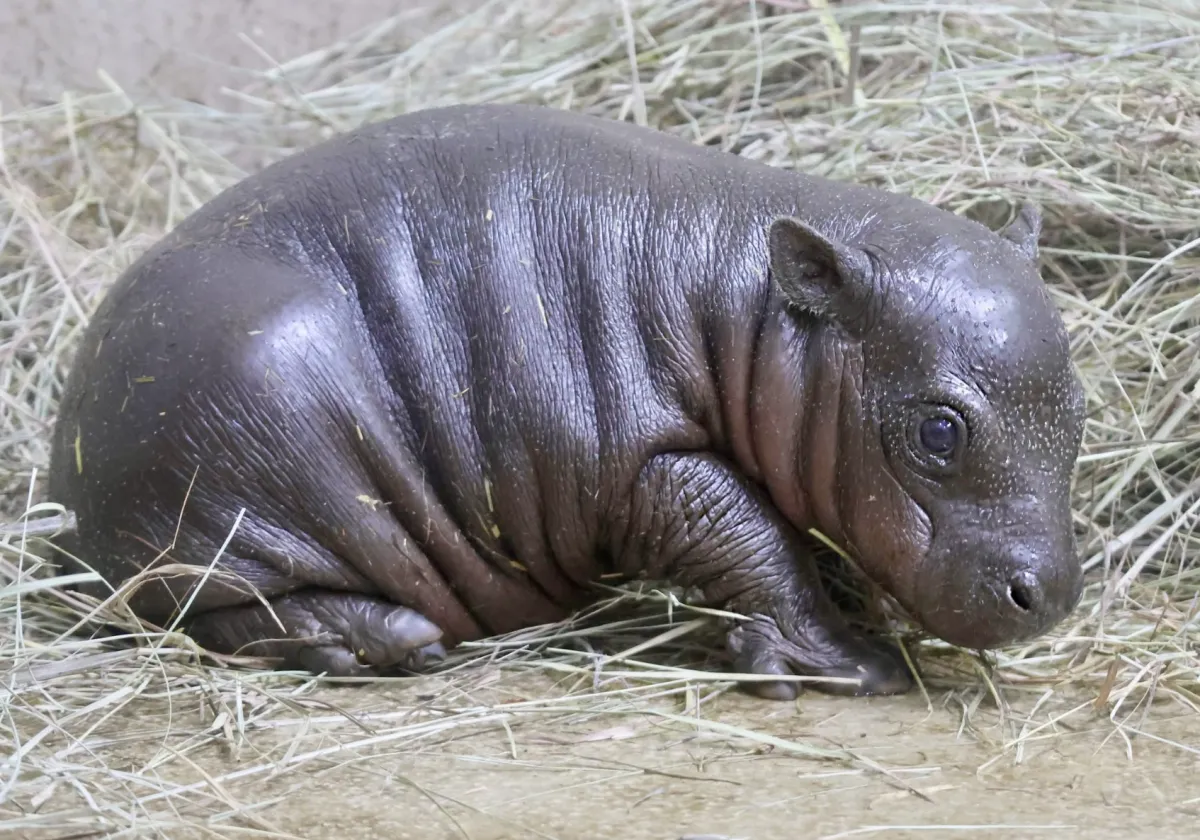
Tiny Hippo, Big News: Critically Endangered Pygmy Hippo Born at Kansas Wildlife Park
Information courtesy of Tanganyika Wildlife Park
Photo credit courtesy: Tanganyika Wildlife Park
GODDARD, Kan. — July 9th, 2025 — A male pygmy hippopotamus calf was born at Tanganyika Wildlife Park on the morning of June 26, 2025, to parents Pluto and Posie—marking a rare addition to a species with fewer than 3,000 individuals remaining in the wild.
The newborn weighed just under 13 pounds at his first veterinary checkup, where he was confirmed healthy and alert. Since birth, the calf has been bonding privately with his mother and demonstrating early signs of confidence and playfulness, including mock-sparring with branches and sprinting laps around the barn.
“Posie is an attentive mother, nursing well and keeping the baby close—a true professional,” said Sierra Smith, Hoofstock Keeper at Tanganyika.
“Every pygmy hippo birth, whether in human care or in their native habitat, is critical for their ongoing survival,” said Dr. Samantha Russak, Curator of Research and Welfare.
This is Posie and Pluto’s fifth calf since their arrival at the park in 2014. With only three pygmy hippo births recorded in the U.S. last year, this calf holds particular significance for cooperative conservation programs aimed at preserving genetic diversity within the species.
Fast Facts
Born: June 26, 2025
Parents: Posie and Pluto (Tanganyika residents since 2014)
Weight at birth: Just under 13 pounds
Behavior: Zooming, branch-sparring, and charming keepers daily
Facility note: Tanganyika is one of only 30 U.S. facilities housing pygmy hippos
Help name the baby! Tanganyika will be allowing the public to vote for baby’s name
A Species on the Edge
Native to the tropical forests of West Africa, pygmy hippos (Choeropsis liberiensis) are currently classified as endangered, with estimates suggesting fewer than 3,000 remain in the wild. The species faces severe threats from habitat destruction, bushmeat hunting, and the mining of coltan, a mineral used in common electronics such as smartphones and laptops.
Fewer than 450 pygmy hippos are currently managed in professional zoological care worldwide. As solitary and nocturnal animals, they are challenging to observe in the wild, making every captive birth vital to advancing scientific understanding.
“This baby is adorable, but he’s also an ambassador for a species that needs our attention,” said Daniel Neale, Marketing Manager at Tanganyika. “Protecting wildlife starts with caring about it.”
Plan Your Visit
Guests can see the hippo family during Tanganyika’s open season (March–November) and participate in the park’s one-of-a-kind Pygmy Hippo Family Meet & Greet, the only encounter of its kind in the U.S. The calf is still bonding with mom behind the scenes, but will make his public debut later this summer.
About Tanganyika Wildlife Park
Tanganyika Wildlife Park is a family-owned and operated zoological facility in Goddard, Kansas, just west of Wichita. The park is home to over 400 animals representing more than 100 species, with a focus on rare and endangered wildlife. Tanganyika is recognized for its highly interactive guest experiences, and participates in multiple cooperative breeding programs, research initiatives, and public education efforts. The park is accredited by the Zoological Association of America (ZAA) and certified by American Humane.
For more information, visit www.twpark.com.

